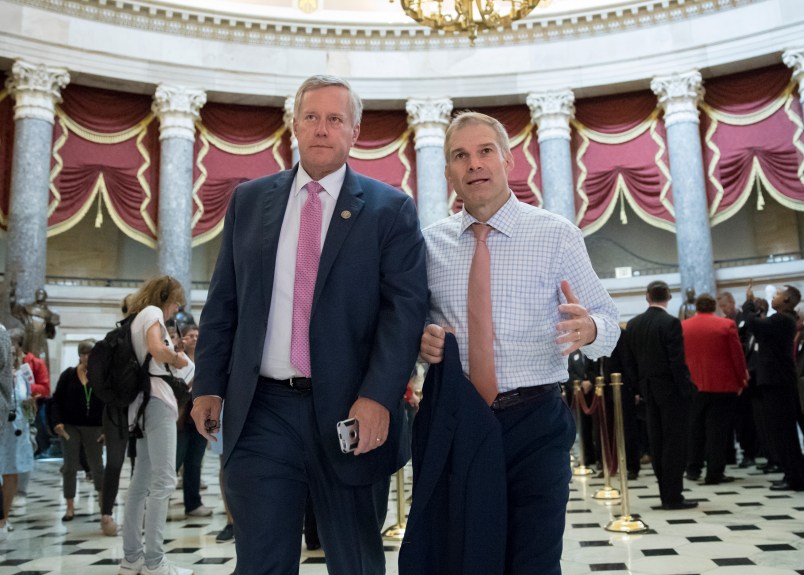As a popular bipartisan bill to stabilize Obamacare’s individual insurance market stalls in the Senate, far-right members of the House told reporters Tuesday that it would be dead on arrival if it ever made it to the lower chamber. Asked if they would consider supporting a far more conservative version of the bill, which halts enforcement of the individual and employer mandates, the lawmakers remained opposed, voicing hostility to any legislation that funds or stabilizes the Affordable Care Act.
“I see it playing out by not playing out,” Scott Perry (R-PA) quipped when asked about the prospects in the House of reinstating the cost-sharing reduction (CSR) payments to insurance companies that President Trump cut off earlier this month.
“Right now it’s a non-starter,” added Freedom Caucus member Rep. Dave Brat (R-VA). “The Senate, first of all, failed to do any semblance of repeal. Then they failed to do a skinny bill. And now they want to do a bipartisan Democrat bill which doesn’t reform Obamacare in any appreciable way.”
Though the text of Alexander-Murry bill would mandate that the government subsidies to insurance companies are used solely for lowering the cost of care for low-income patients, the Freedom Caucus members repeatedly employed President Trump’s characterization of the payments as a “bailout” and “kickback” for insurers.
“We haven’t cut taxes yet. We haven’t started construction on the border wall. But now we’re going to bail out insurance companies?” Rep. Jim Jordan (R-OH) asked. “You’ve got to be kidding me. Of course we’re opposed.”
Rep. Mark Walker (R-NC), the leader of the influential Republican Study Committee, said he’s “having such a tough problem with the CSR payments” no matter what tradeoffs are included in the bill. He then incorrectly characterized a past court ruling about the CSR payments that found the executive branch could not appropriate the money without approval from Congress, telling reporters CSR payments themselves “were ruled unconstitutional and illegal.”
“That causes me great consternation as far as moving forward,” he said. “I just can’t sit here and look the other way while bills like Murray-Alexander say, ‘Well, let’s just throw the CSR in there and hope this all works out.'”
The Republican lawmakers, who took a tough vote on a deeply unpopular Obamacare repeal bill earlier this year only to see it fail in the Senate, voiced a great deal of pent up frustration and resentment toward the upper chamber.
“We have huge issues with leadership in the Senate who can’t get it straight on the basic core issues,” Brat complained.
“I feel like the House is a military operation,” mused Rep. Matt Gaetz (R-FL). “We’ve got a general. We have majors. And we have a bunch of us privates. Whereas in the Senate, 100 Somali warlords.”
Perry added that the only “palatable” bill they’d accept from the Senate would be one that funds CSRs temporarily as part of a full repeal of the Affordable Care Act—a formula the Senate has already demonstrated they are unable to pass.
As the health care stalemate on Capitol Hill continues, the uncertainty over the payments has caused insurers to dramatically hike their premiums and exit some markets entirely. Many health care experts say the public feud over the payments may also depress enrollment, which begins on Nov. 1, due to mass confusion about whether subsidies will still be available to consumers. Trump’s defunding of CSRs will not impact Americans’ eligibility for subsidies, and only blocks the insurers from getting reimbursed.







But it’s the Democrats who won’t work with Republicans.
commence health care shit storm in 3…2…1…
when there was all of this “excitement” last week about the big Senate compromise bill, it was easily predictable that it was going no where based on House statements, or somehow tricking the Moron into signing it against his will
stage is being set for medicare for all
You are an optimist.
I’d give anything to share that world view.
Once again, the Republican Party demonstrates that it can offer nothing positive for the American People. The Republican Party is the equivalent of the Party of Perpetual Failure.
It won’t be DOA if Ryan would let non-crazy Republicans and Democrats vote on it.